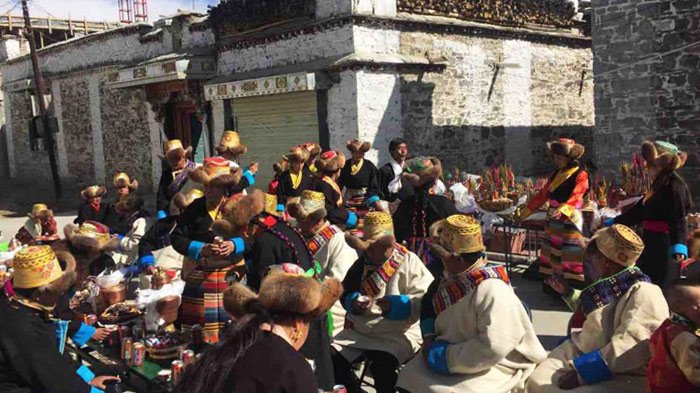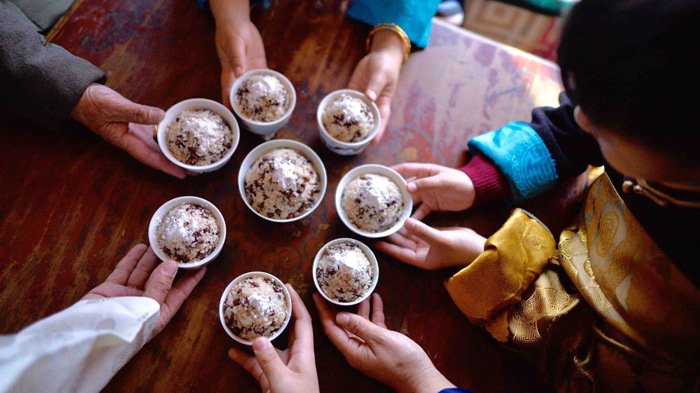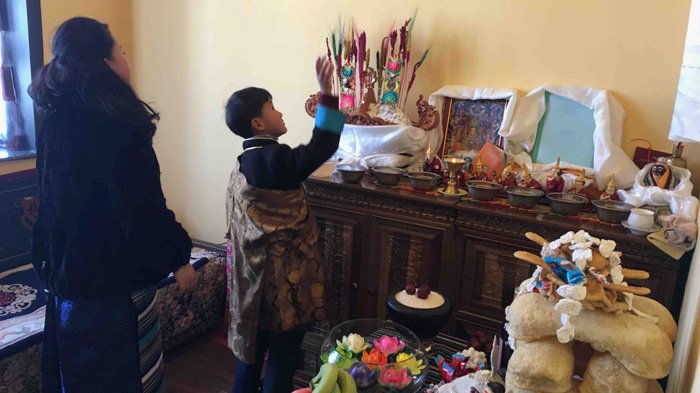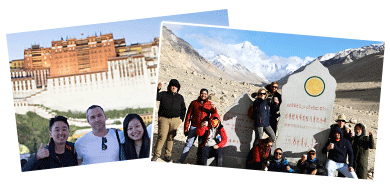
Tibetan New Year Etiquette
Tibetan New Year Greeting
The unique way of celebrating Tibetan New Year (also known as Losar) couples with distinctive etiquette. Travelling in Tibet during Tibetan New Year, tourists can discover more about the Tibetan culture and customs from how do Tibetans greet and address with each other.

Jointly celebrate Tibetan New Year with Tibetan friends
“Tashi Delek”= Blessings and Good Luck
Undoubtedly, the most frequently used words for greeting people are “Tashi Delek”, which basically means auspicious and all the best. During Tibetan New Year, this phrase is taken as the most orthodox ways of greeting people. No matter when Tibetans visit friends and relatives’ home or sprinkle tsampa from chemar, the first words you will hear are always “ Tashi Delek”.

Tibetan words: Tashi Delek
“Losar Bey Tashi Delek”= Prosperity and Good Will
Bacially, Tibetan words for New Year are known as Losar. “ Lo” literally means “Year” while “Sar” means “New”. “Losar Bey Tashi Delek” is a pretty common way of greeting during Tibetan New Year, next to “Tashi Delek”.
“Kra Shis Bde Legs Phun Sum Tshogs”= Longevity and Good Fortune
On the first day of Tibetan New Year, Tibetans only stay at home with their family members. The housewives will get up extremely early and rush to get the “First Water” in the New Year and later make traditional Tibetan food with it like droma dresil (Tibetan sweet rice), drothuk (porridge with yak meat), changkol, chang ( barley wine), tsampa, butter tea, ect.

Droma Dresil is one of the traditonal foods for Tibetan New Year.
After housewives get their children dressed, the children will greet the senior of the family and wish them “Kra Shis Bde Legs Phun Sum Tshogs ”, a common way of expressing longevity and boundless beneficence.
“A Ma Bag Gro Sku Khams Bzang”= Longevity and Health to people of the same generation
“Ama badro kunkham Sang”= Good Health for Mothers
In Tibet, traditionally industrious and versatile Tibetan women are in charge of most the housework while taking great care of their children. In return, they receive much respect in the family. While visitors splashing the tsampa from chemar, they “Ama badro kunkham Sang” is often heard together with “Tashi Delek”.
“Gtan Du Bde Ba Thob Par Shog”= Happy and Prosperous New Year
This phrase is a general way to express one’s excitement and happiness to New Year to each other.
“Lo Sar Bzang”= Happy New Year
“Bkra Shis Bde Legs”= Lucky and Fortunate
Tibetan New Year Taboo
Traditionally, certain taboos shall be avoided during Tibetan New Year. To international tourists, it’s better to learn the following taboos before making awkward mistakes.

A child is sprinkling a small amount of tsampa from chemar when visiting relatives' family.
Dos and Don’ts When Visiting Tibetan Family
a.Never looked absent-minded or ignore the person who you are talking with
b.Never use single hand to accept host’s gift or butter tea. You should use both hands to your respect. Likewise, when proposing a toast,
please use both hands to raise the cup or tea and do not put your fingers into the cup.
c.When drinking butter tea, never finish all of it with one drink. Meanwhile, you should drink at least two cups of butter tea. And never make other noise while drinking the tea.
d.Never go to toilet shortly after you finish the dinner
e.Never spit or clap your hands randomly in Tibetan’s family
f.When meeting the lovely kids in the family, never stroke their heads with your hands.
g.If you need to sit on the bed, never sit on the Tibetans’ clothes. You may put the clothes somewhere else, and then sit still.
h.Always do things after the elder in the family and never call their names directly.
i.Avoid saying words like “die”, “get sick”, “kill”, “poor”, “flood”, “earthquake”, etc. for Tibetans believe that such conversation may influence your good luck and happiness in the new year.
Traditional Taboos to Tibetan Family
a.On the first day of Losar, Tibetan families normally don’t welcome outsiders. They only celebrate the New Year with their own relatives.
b.In the morning, Tibetan parents shall never blame children and speak dirty words. Meanwhile, family members need to eat as much food as they possibly could. By doing so, in return they will lead a sufficient life in the New Year.
c.Fill the water tank full without spilling water. Otherwise, it will be deemed ominous. In this case, water is very likely to symbolize the fortune
d.Never throw yak dung away from home or lend anything to others. It is believed that if the yak dung is thrown away or the host lends anything to others on day 1 of the New Year, his or her family can never raise good cattle and lose bumper harvest, and ultimately never gets rich.
e.On 29th of Dec, traditionally Tibetan family will stay together to eat Guthuk and later use barley torch and tsampa, firecracker, etc to exorcise evil spirts or ghost. None of the family member shall come home too late at night. Once all the tools used to dispel ghosts are thrown into fire, you can’t look back again. Otherwise, all the work will be in vain.
Recommended Tibetan New Year Tour

Energetic, responsible and reliable, Sonam is a guide with more than seven years experience informing visitors about heritage sites and attractions places in Tibet.


.jpg)



0 Comment ON "Tibetan New Year Etiquette"